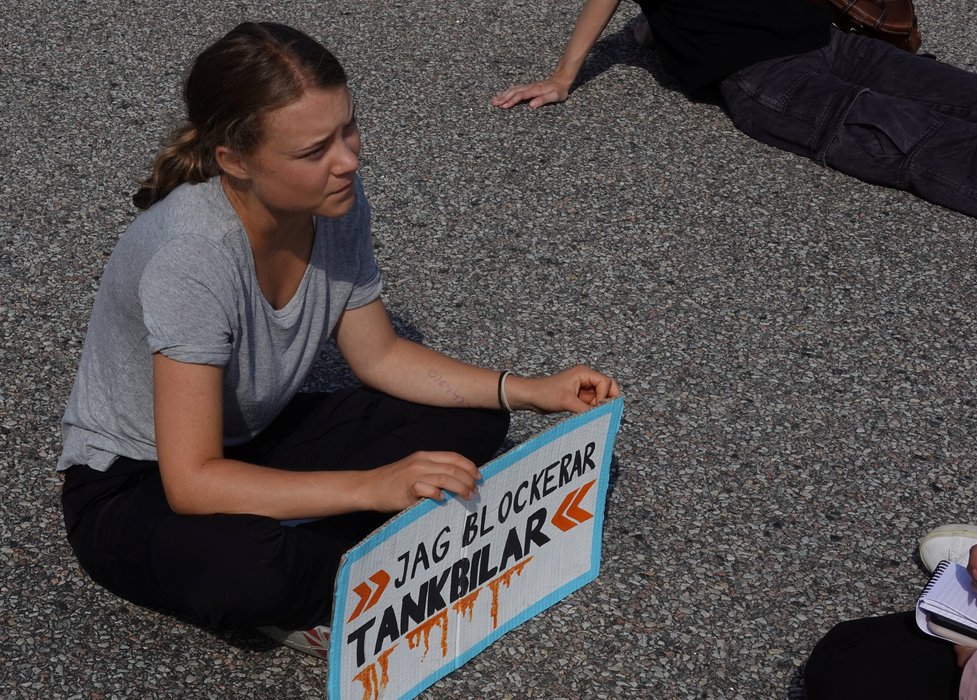
Freedom of peaceful assembly
Greta Thunberg fined for participation in climate protests
On 19th June, climate activist Greta Thunberg was charged with disobeying a police order after refusing to leave a climate protest in Malmö, where protesters blocked a road to stop oil trucks from reaching the harbour. At a hearing on 24th July, she was found guilty and ordered to pay a fine, with the court set to later determine the amount according to her income. Thunberg pleaded not guilty, arguing she acted out of necessity due to the climate crisis.
In September, she received another fine of nearly EUR 230 for participating in an unauthorised protest that blocked traffic, in relation to the same event.
Violence breaks out at Eritrean festival in Stockholm: over 50 injured, protest permits revoked
On 3rd August, protesters of Eritrean origin gathered in Järvafältet, north of Stockholm, where a four-day Eritrean cultural festival was being held accusing the festival organisers of supporting the Eritrean regime and inviting sympathetic guests. Although the demonstrators had been permitted to stage a protest from a short distance, they broke through police barriers and stormed the festival, using stones and other objects as weapons. They set fire to tents and cars. The next day, the police revoked the group’s protest permits for 4th and 5th August. Over 50 people were injured, eight of them seriously, and the police arrested around 140 people. One man was sentenced to 18 months in prison for grievous bodily harm, a charge he denied.
In a written statement, Justice Minister Gunnar Strömmer said, "it is not reasonable for Sweden to be drawn into other countries' domestic conflicts in this way (...) The police's resources are needed for other purposes than keeping different groups apart from each other." However, much of the country’s diaspora views such festivals as a display of power by the regime to whitewash its image, promote hate speech, and intimidate those who have fled the dictatorship.
Freedom of expression
Sweden's Quran burnings spark global protests, debate on freedom of expression
Diplomatic tensions between Sweden and Muslim-majority countries intensified over the summer as requests for permits to protest by burning holy books increased in Sweden. As previously reported by the CIVICUS Monitor, a conflict with Turkey over this issue threatens Sweden's NATO membership application. Protests targeting Sweden broke out in Iran and Iraq, leading to the evacuation of Swedish embassy staff and the burning of the embassy in Baghdad. Later in July, Iraq expelled the Swedish ambassador and withdrew their chargé d'affaires.
According to Swedish law, protests involving the burning of holy books and similar acts can only be banned if they threaten public safety or target a specific ethnic group. In July, an investigation was opened into the organiser of one such protest for “incitement to hatred against a population group”. In October, another man was convicted for inciting hatred for filming himself burning a Quran on a barbecue along with bacon while playing a song associated with the 2019 Christchurch mosque shooting in New Zealand. The prosecutor emphasised that the case was not based on the burning of the Quran, but rather on the fact that the man had filmed himself doing so and had used music associated with the terrorist attack in New Zealand.
The Swedish Police Authority currently lacks the mandate to consider general security risks, such as terrorist threats, when issuing permits for public gatherings. Justice Minister Strömmer highlighted this security gap and is seeking proposals to include national security considerations in these assessments. The Social Democrats, the Centre Party, and the Greens argue that freedom of speech in Sweden must be protected and do not believe the law needs to be changed.
Amid these tensions, Morgan Johansson, leader of the opposition Social Democrats, called for Sweden Democrat MP Richard Jomshof to resign from his position as president of the Riksdag's Committee on Justice, following remarks Jomshof made on X, criticising Islam and the Prophet Muhammad. Johansson argued that Jomshof posed a security risk to Sweden.
In October, Swedish migration authorities withdrew the residence permit of Salwan Momika, an Iraqi refugee known for burning copies of the Quran on several occasions, on the basis that he had provided false information in his original asylum application. Due to facing persecution in his home country, he has nevertheless been granted a temporary stay permit until April 2024. However, his long-term permit will not be renewed, a decision he plans to appeal.